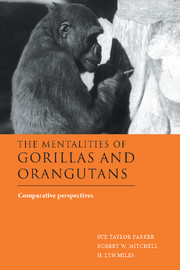Book contents
- Frontmatter
- Contents
- List of contributors
- Preface
- Acknowledgments
- I Comparative evolutionary and developmental perspectives on gorillas and orangutans
- 1 Hominid family values: morphological and molecular data on relations among the great apes and humans
- 2 The life history and development of great apes in comparative perspective
- 3 The frontal lobes of the great apes with a focus on the gorilla and the orangutan
- II Cognition and tool use in gorillas and orangutans
- III Communication in gorillas and orangutans
- IV Social cognition in gorillas and orangutans
- V Epilogue
- Index of authors
- Index of subjects
2 - The life history and development of great apes in comparative perspective
Published online by Cambridge University Press: 20 October 2009
- Frontmatter
- Contents
- List of contributors
- Preface
- Acknowledgments
- I Comparative evolutionary and developmental perspectives on gorillas and orangutans
- 1 Hominid family values: morphological and molecular data on relations among the great apes and humans
- 2 The life history and development of great apes in comparative perspective
- 3 The frontal lobes of the great apes with a focus on the gorilla and the orangutan
- II Cognition and tool use in gorillas and orangutans
- III Communication in gorillas and orangutans
- IV Social cognition in gorillas and orangutans
- V Epilogue
- Index of authors
- Index of subjects
Summary
Life-history strategy theory is the comparative study of the shape of the life cycle and the ontogeny of form and function as they relate to reproductive success in individuals and populations. According to this theory, life cycles have been shaped by selection in such a manner that life-time resources are allocated among the functions of growth, maintenance, defense, and reproduction in a manner that maximizes life-time reproductive potential (Pereira, 1993). Such design occurs within developmental and phylogenetic constraints, of course (Smith et al., 1985).
Life-history theory expands the focus of evolutionary biologists beyond morphology and behavior to include developmental and behavioral processes through the life cycle as parts of an integrated whole. Basic data for life-history studies include population data on the following features: body size, gestation length, age at weaning, birth interval, number of offspring per litter, offspring per year, neonatal body weight, adult body weight, age at onset of reproduction, lifespan, and mortality at various stages in the life cycle (Promislow & Harvey, 1990; Stearns, 1992).
Some biologists have characterized two contrasting life-history strategies. K strategists are large, long-lived animals that mature slowly and produce few offspring in each reproductive effort, but invest heavily in each offspring. They generally are adapted to ecological niches that are fairly stable over their lifespans. (Most anthropolid primates are K strategists.) In contrast, r strategists are small, short-lived animals that mature rapidly and produce large numbers of offspring in one or a few reproductive efforts, investing little energy in their offspring. They generally are adapted to unstable ecological niches that are subject to booms and busts, and are able to respond to resource booms with rapid population growth (MacArthur & Wilson, 1967).
- Type
- Chapter
- Information
- The Mentalities of Gorillas and OrangutansComparative Perspectives, pp. 43 - 69Publisher: Cambridge University PressPrint publication year: 1999
- 3
- Cited by



